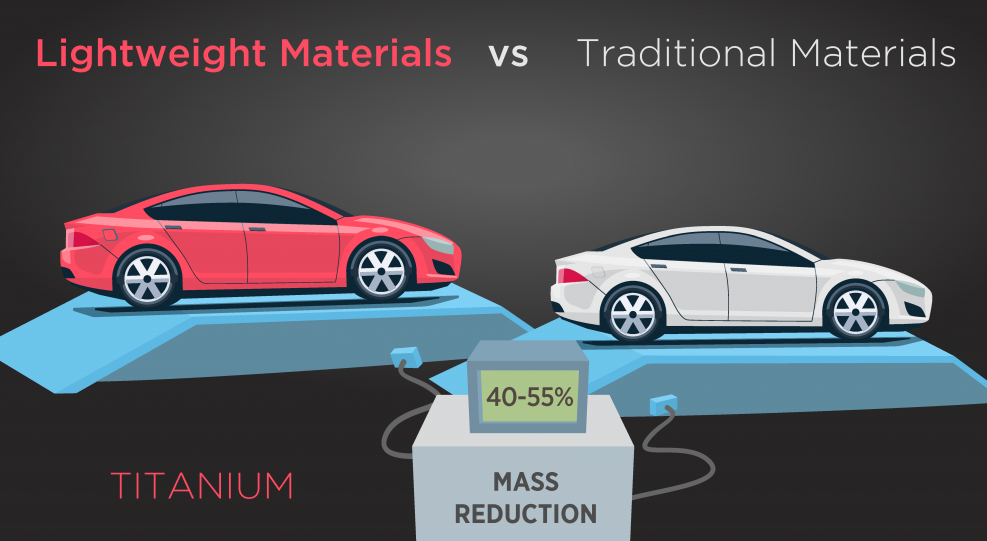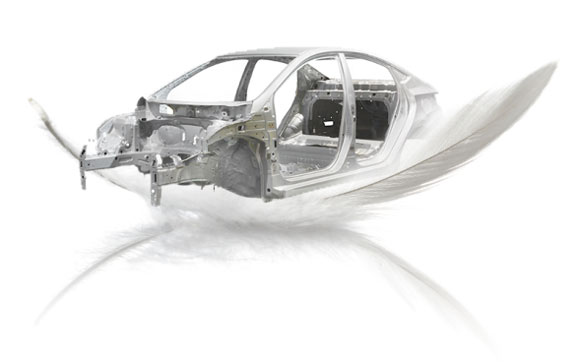How Is Titanium Used in Automotive Lightweight?

How Is Titanium Used in Automotive Lightweight?
Titanium and titanium alloy has the characteristics of low density, excellent mechanical properties, good biocompatibility, corrosion resistance, high-temperature resistance, and good low-temperature toughness. At present, they have been widely used in automobile manufacturing. In this article, we will take a look at how is titanium used in automotive lightweight.

How Is Titanium Used In Automotive Lightweight
The density of titanium alloy is only 60% of steel, and the strength can reach more than 800MPa. It still maintains good mechanical properties at about 500°C and has good welding and forming properties. It has been used in the manufacture of racing cars more than 20 years ago, greatly reducing the quality of racing engines and improving engine performance.
Applications of Titanium and Titanium Alloys in Automotive Lightweight
At present, titanium alloy components used in automobile manufacturing are mainly distributed in automobile exhaust systems, engine systems, transmission and vibration reduction systems, and car body frames.

Automotive Lightweight
1. Automobile Exhaust Systems
Automobile exhaust system materials are required to have good high-temperature mechanical properties and corrosion resistance to S and Cl elements. Traditional exhaust valve components are made of stainless steel, but it has been found that titanium alloys are more suitable for exhaust valve materials in terms of performance.
The titanium return pipe used in the new Chevrolet Corvette Z206 effectively avoids the problems of pitting and weld corrosion on the stainless steel pipe, while also improving the fuel combustion efficiency and acceleration ability, and shortening the braking distance.
2. Engine Systems
The automobile engine system is the most used part of titanium alloy in the automobile field. The application of titanium alloy in the engine system mainly includes the valve, connecting rod, crankshaft, valve seat, and other parts.
The Valve
In terms of titanium alloy valves, the United States and Japan have conducted a lot of research work. The United States currently uses Ti-6Al-4V alloy to make intake valves and Ti-6Al-2Sn-4Zr-2Mo alloy to make exhaust valves. Toyota, Japan, uses Ti-6Al-4V/Ti B alloy to prepare intake valves, and Ti-Al-Zr-Sn-Mo-Nb-Si/Ti B alloy to prepare exhaust valves.
The Valve Seat
Titanium alloy valve seats have been widely used in racing and sports cars, and more than 250,000 sets are produced every year, mainly made of Ti-6Al-4V or Ti-5Al-2Cr-1Fe alloy. Due to the relatively simple shape of the valve seat, it does not require high mechanical processing and does not require special surface treatment, the cost is relatively cheap, and the effect is obvious in terms of car weight reduction.
The Connecting Rod
The use of titanium alloy connecting rods can effectively reduce the quality of the engine and improve the performance of the car. At present, the main preparation material is Ti-6Al-4V alloy.
The Crankshaft
Although titanium alloy crankshafts are not widely used at present, the Ti-3Al-2.5V alloy specially developed by Japan has been verified on Honda racing cars. While effectively reducing the mass, the engine speed was increased by 700r/min, which proved the superiority of the titanium alloy crankshaft.
3. Damping Suspension Systems
The core component of the automobile damping suspension system is the suspension spring. Compared with general automobile spring steel, titanium alloy has a higher specific strength and lower shear modulus, and higher fatigue strength, making it more suitable for manufacturing automobile damping springs.
4. Car Body Frames
Conclusion
Thank you for reading our article and we hope it can let you have a better understanding of how is titanium used in automotive lightweight. If you want to learn more about titanium or other refractory metals, we would like to advise you to visit Advanced Refractory Metals (ARM) for more information.
Headquartered in Lake Forest, California, Advanced Refractory Metals (ARM) is a leading manufacturer & supplier of refractory metals & alloys across the world, offering customers high-quality refractory metals & alloys like tungsten, tungsten alloys, molybdenum, molybdenum alloys, tantalum, rhenium, titanium, and Zirconium.
{{item.content}}
LEVE A REPLY
{{item.children[0].content}}
{{item.content}}






